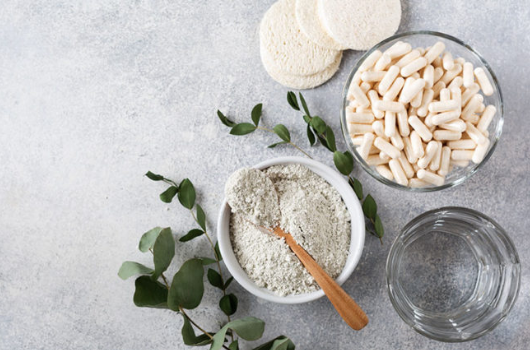To get started, you can conduct a simple test and find out if your collagen production decreased.
It is necessary to answer each question “yes” or “no” and count the number of positive answers.
Do you have pronounced wrinkles even when your face is relaxed?
Do you notice that the skin has become less firm and elastic?
The quality of your hair has deteriorate – do they fall out, grow dull, split?
Do your nails grow poorly and constantly break, exfoliate?
Are you prone to cavities and other dental problems with good oral hygiene?
Have you noticed a decrease in visual acuity lately?
Do you feel muscle weakness even when well rested?
Do you have more sports and domestic injuries?
If you answered “yes” to three or more questions, you may suspect a decrease in collagen production.
So, collagen consists of three amino acids – glycine, proline and hydroxyproline, some of which come from food, and some are synthesized in the body. But with age and under the influence of negative factors (toxic load, long exposure to the sun, hormonal imbalance, stress), collagen production decreases, and its quality deteriorates.
Depending on the amino acid composition, there are three main types of collagen:
Type I – It is the most abundant and strongest type of collagen in the human body. It is involved in the formation of tendons, ligaments, organs, tissues, skin and bones and is very important for tissue regeneration, wound healing, skin elasticity, and also prevents tissues from tearing.
Type II – First of all, it is especially important for flexible, strong joints, it promotes the formation of cartilage tissue and ensures mobility and a healthy state of the joints. It helps prevent age-related joint pain and various symptoms of arthritis, rheumatism and other joint diseases.
Type III – Collagen of the third type includes reticular fibers and the main component of the extracellular matrix, it is the basis of organs and skin. It is usually found in combination with the first type of collagen and is important for the elasticity and firmness of the skin, blood vessels, and heart tissues. Deficiency of type 3 collagen significantly increases the risk of vascular rupture and in some critical cases increases the risk of mortality.
Collagen in the body is constantly consumed and replenished. To maintain the health of all organs and systems, it is important that the consumption of collagen does not exceed its replenishment.
In addition to the types of collagen, there are also various sources of collagen. Sometimes bovine collagen is obtained from cattle cells and marine collagen is obtained from fish.
Marine collagen is primarily a Type I collagen, while bovine is typically a mixture of Type I and Type III.
The first type of collagen is animal. Its molecules are not quite similar to those of human collagen. Accordingly, the body has to spend energy on its transformation for more convenient absorption. The percentage of absorption of animal collagen is much lower than that of marine collagen. European countries are the leaders in the production of animal collagen. But lately, they have been forced to reduce its production due to frequent epidemics and diseases of cattle. Through such collagen, the disease can be transmitted to people.
PROS OF BOVINE COLLAGEN:
One benefit of bovine collagen is that it is cost effective. It is cheaper than marine collagen, but this is also because it is more cheaply made. When it comes to collagen, a cheaper product might be good for the wallet, but not so great for your body.
Another benefit is that you can take it if you can’t have fish for any reason. In this case, it is a good alternative to marine collagen. It’s important that you choose grass-fed collagen, if you decide to take the bovine variety. As we already discussed, land animals do have a higher tendency for contamination, so make sure the product you buy is the cleanest available.
The second type of collagen is marine.
Marine collagen is absorbed up to 1.5 times more efficiently in the body, and the bioavailability is superior to other types of collagen. This is due to its smaller particle size compared to other types of collagen.
It is considered the most effective and easily absorbed by the human body. Since its molecules are very similar to those of human collagen. The methods for obtaining marine collagen are so innovative that it is possible to separate the molecule of this protein into peptides, i.e. even smaller components. Marine Collagen Peptide is quickly absorbed and directed to precisely those places in the body where it is severely lacking. From this, when taking fish collagen peptide, different people experience a different effect. In older people, the body sends all the collagen it receives to the joints and cartilage to strengthen them, but its effect is not noticeable on the skin. In younger people, collagen can be distributed to both joints and other organs to repair connective tissues.
PROS OF MARINE COLLAGEN:
The biggest pro of marine collagen is that it is the most bioavailable of all other types of collagen. This means it helps digest more quickly and more easily. Another pro is that, when wild-caught, it is the cleanest of the available types of collagen.
As with any dietary supplement, it is extremely important to find the cleanest and best one available, as it will be directly absorbed by your body. Marine collagen that is wild-caught is typically regarded as the safest and best variety. Of course, there are companies that don’t produce the best quality products so it’s a good idea to do your research and know your product.
One of the biggest reasons people take a collagen supplement is to help improve their skin. Whether it be for wrinkles, glowing skin, or better skin elasticity, marine collagen is the best type to take for skin beautification and strengthening. Similarly, it is regarded as the best collagen for medicinal uses, such as wound healing.
It is pescatarian friendly, and safe to consume for those who cannot have meat products for any reason. This makes it an overall great option for anyone, with the exception of vegans and those with fish allergies.
Another pro is that there is no ‘fishy’ taste or smell, and it easily blends into smoothies, water, coffee, and pretty much anything else.
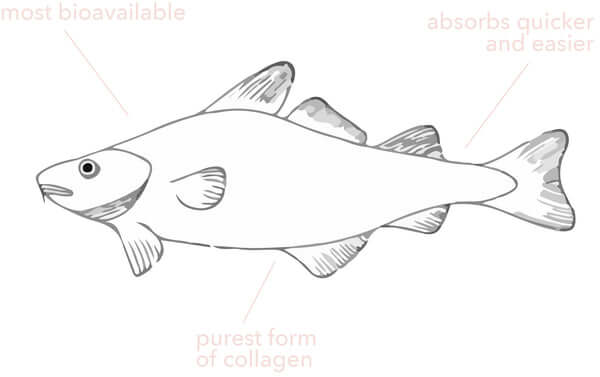
How is collagen made in the hydrolyzed form?
Since collagen is a family of proteins made up of amino acids, when collagen is used as a supplement, the protein needs to be broken down into polypeptide chains.
Polypeptide chains are more simply described as a peptide (short chain of amino acids) consisting of two or more amino acids. The polypeptide in this instance is hydrolyzed collagen, which is also known as collagen peptides.
How collagen is made in the hydrolyzed and nano-hydrolyzed form is through the process of hydrolysis.
The reason denatured collagen needs to go through this process is to help it be more absorbable and so it does not turn to gel while retaining surface-active properties. The majority of collagen that goes through this process is type 1 collagen because it is often used as gelatin.
Where the collagen is sourced from depends on the type of collagen used. For instance, most type 1 collagen would be sourced from bovine, pig, or marine sources. However, you can also extract type 3 collagen from bovine and marine sources as well.
Type 2 collagen is often collected from chicken sternum cartilage.
Whatever the source of the collagen, how collagen is made into hydrolyzed collagen generally follows the same process.
The processing of the raw collagen so it can become hydrolyzed or nano-hydrolyzed collagen follows the following steps:
- Collection of raw collagen
- Chemical breakdown
- pH adjustment
- Extraction to turn collagen into gelatin
- Enzymatic hydrolysis
- Ion exchange
- Filtration
- Evaporation and sterilization
- Spray drying
- Resulting in hydrolyzed collagen
One common source of collagen protein is animal bones, specifically bovine bones. When using this source for collagen, manufacturers soak the bones with acid to demineralize them and create a brittle material that is easier to work with. This is called ossein.
Once the ossein is made, they need to remove any impurities and neutralize the pH. To do this, manufacturers simply wash the ossein with water. Then, to make the collagen into gelatin or to make it water soluble, they will subject it to a secondary acid treatment and hot water wash.
If manufacturers choose to source from animal skin or hide, there may be fewer steps to get to a gelatin or water-soluble collagen.
From here, they can begin the hydrolysis process.
Enzymatic hydrolysis is done with water. It is the breakdown of the specified compound, in this case collagen, in the presence of enzymes following a reaction with water.
It is also possible to go through this process using a chemical hydrolysis, but most manufacturers prefer the use of enzymatic hydrolysis because it allows for better control. A combination of the two may also be used in order to reach the desired molecular weight.
The molecular weight of hydrolyzed collagen is perhaps the most important factor in the production process when discussing the desired functional properties.
While the process listed above is standard, it can also utilize advanced membrane filtration techniques to fractionate the collagen during the separation process. When using this membrane, it can reduce the energy required and save some water through recycling.
Whatever process they choose to use for hydrolysis, the end result is hydrolyzed collagen. Once the manufacturer has obtained the hydrolyzed collagen, then it must be filtered, sterilized, and dried (if it is powder).
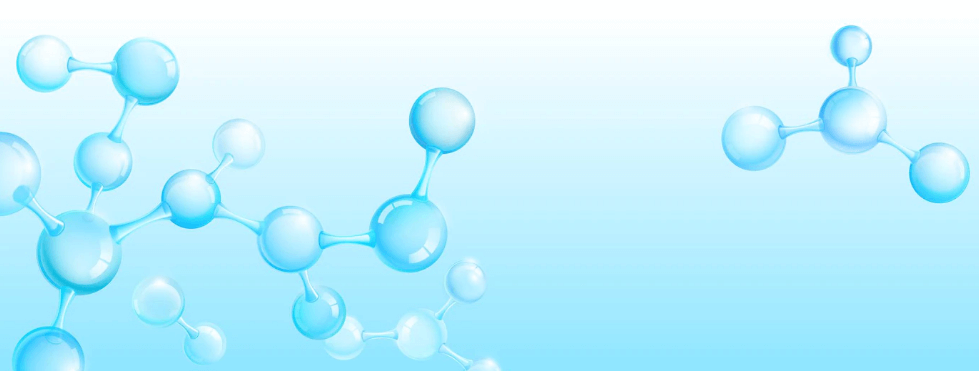
How does collagen enter our body?
First of all, with food. The main sources are animal protein, edible gelatin, bone broth, aspic. For the normal assimilation of amino acids, a full-fledged work of the gastrointestinal tract and the enzymatic ability of the body to absorb protein are necessary.
In addition, our own body synthesizes collagen. Collagen synthesis requires coenzymes – vitamin C, amino acids, as well as vitamins B6, B12, A, D and minerals – copper, iron, zinc, calcium, magnesium.
With the use of additional collagen supplements.
Dietary supplements come in completely different forms (powder, tablets, drinking collagen) and origin (marine, animal, vegetable collagen).
To date, there are already quite a few studies supporting the benefits of taking collagen supplements.
Collagen helps to increase the elasticity and density of the skin, reduces signs of aging and dryness, and promotes wound healing.
Improve the quality of nails. Collagen supplements help increase the rate of nail growth, reduce nail fragility, and improve appearance.
Improve the condition of the joints. Supplements can reduce pain and inflammation in joints, prevent cartilage breakdown, increase cartilage density, and increase range of motion.
Reduce the risk of injuries to bones, muscles, ligaments, cartilage and tendons, increasing their density, elasticity and restoring integrity.
Improve the synthesis of your own collagen. Taking collagen supplements stimulates fibroblasts (cells that synthesize collagen) to work more efficiently.
Protect against inflammation due to the action of glycine.
What characteristics should be taken into account when choosing a dietary supplement with collagen?
Of course, the purity of the composition and the amount of ingredients. The purity of the composition will be indicated by a mark on the test for the absence of heavy ones. This is especially important for marine collagen, the raw material for which is fish, which can accumulate toxic substances.
In the amount of ingredients, the main rule is the less the better. Vitamins A, C, E, hyaluronic acid, biotin, silicon dioxide, alpha lipoic acid are needed for better absorption of the supplement. But flavorings and preservatives can cause side effects.
Why Should You Take Hyaluronic Acid with Collagen?
Collagen and hyaluronic acid are the key components of healthy, youthful skin (as well as joints). They are a powerful duo that support one another, but individually they have very different benefits. Taking both is ideal if you are looking for a top notch anti-aging supplement plan. Below are tree reasons why:
- Hyaluronic Acid Binds Moisture to Collagen: Because of HA’s ability to attract and hold water, it serves as the mechanism within your skin that actually allows collagen to retain water.
“hyaluronic acid binds water to collagen, helping keep skin elastic.”
- It Reduces Wrinkles on its Own:One of the most heavily sought-after benefits of collagen is its ability to reduce the appearance of fine lines and wrinkles. Coincidentally, Hyaluronic provides similar benefits on its own.
- Lubricates Joints & Reduces Joint Pain:Another benefit of pairing hyaluronic acid and collagen is that HA enhances collagen’s positive impact on joint health. That’s because HA is naturally found in the fluids that surround our joints. The cool part is that supplemental HA can improve joint health – in fact a thorough 12-month study conducted in 2012 showed that it (supplemented orally) improved symptoms of knee osteoarthritis.
Who can benefit from supplemental collagen intake?
In fact, collagen intake can be recommended to almost everyone:
– when recovering from fractures, sports injuries, high physical exertion.
– with osteoporosis to increase bone density and their resistance to fractures.
– with polymorphism of the gene responsible for the synthesis of collagen.
– as an anti-aging support for the deterioration of the skin, hair and nails.
How to use collagen correctly?
Of course, it all depends on the form of the supplement and the manufacturer’s recommendations, but the basic rules are:
on an empty stomach, at least 30 minutes before a meal or not earlier than two hours after the last meal, and if the dietary supplement does not contain vitamin C, an additional intake of 60–120 mg of vitamin C is recommended to increase the effectiveness of the supplement.
Let’s take a look at the example of several manufacturers what collagen supplements are.
1) Neocell Super Collagen C
Collagen from Neocell contains collagen types 1 and 3, which is about 90% of the required supply of collagen that the body needs.
Vitamin C has been added to the product. Since vitamin C normalizes collagen synthesis, stabilizes the collagen molecule, protects it from damage, makes collagen more mature and stimulates the synthesis of its own collagen. Vitamin C deficiency leads to the fact that the quality of collagen synthesized in the body will be low, it will be looser.
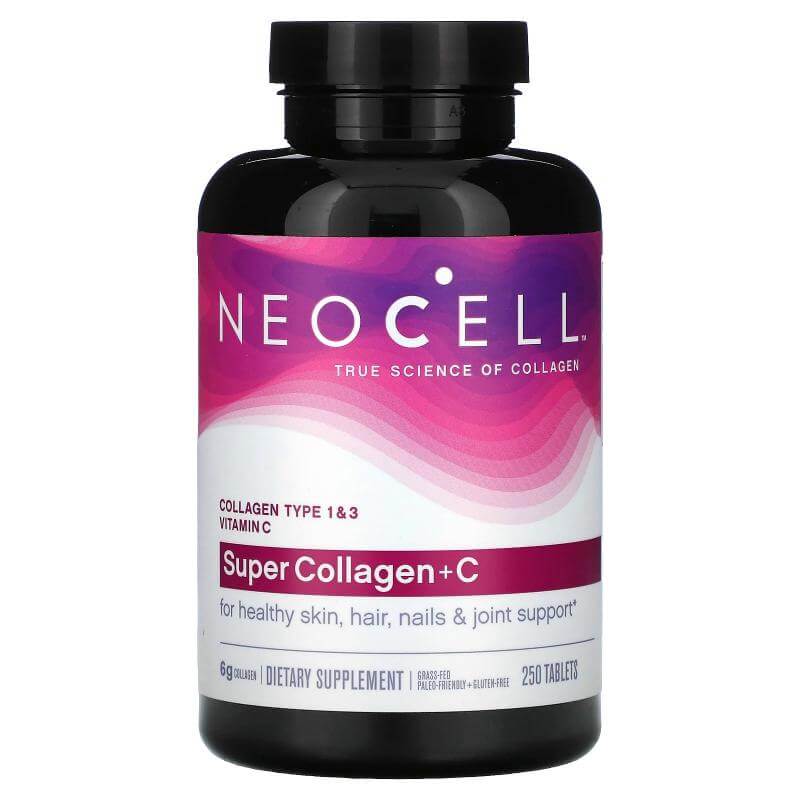
2) Neocell MarineCollagen
It is a balanced complex with marine collagen supplemented with hyaluronic acid, vitamin C, B vitamins and minerals. Since collagen and hyaluronic acid are the two most important substances that are necessary for the youth and beauty of our skin and the health of our bones, ligaments and joints, they are best taken together. In addition to moisturizing properties, hyaluronic acid also maintains volume, it fills the space between the collagen fibers, like a scaffold. Positive actions from the reception of such a complex will not keep you waiting.
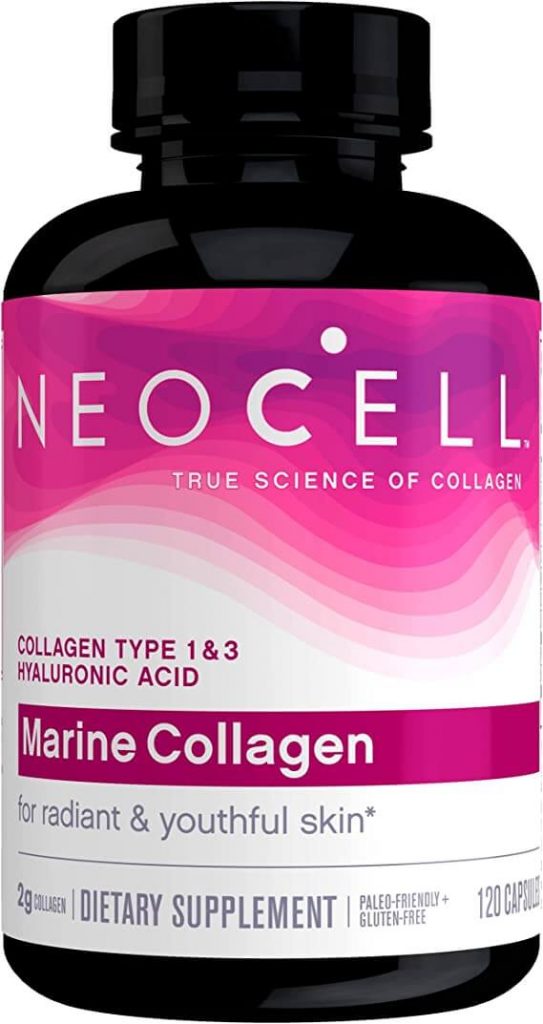
3) California Gold Nutrition CollagenUP 5000
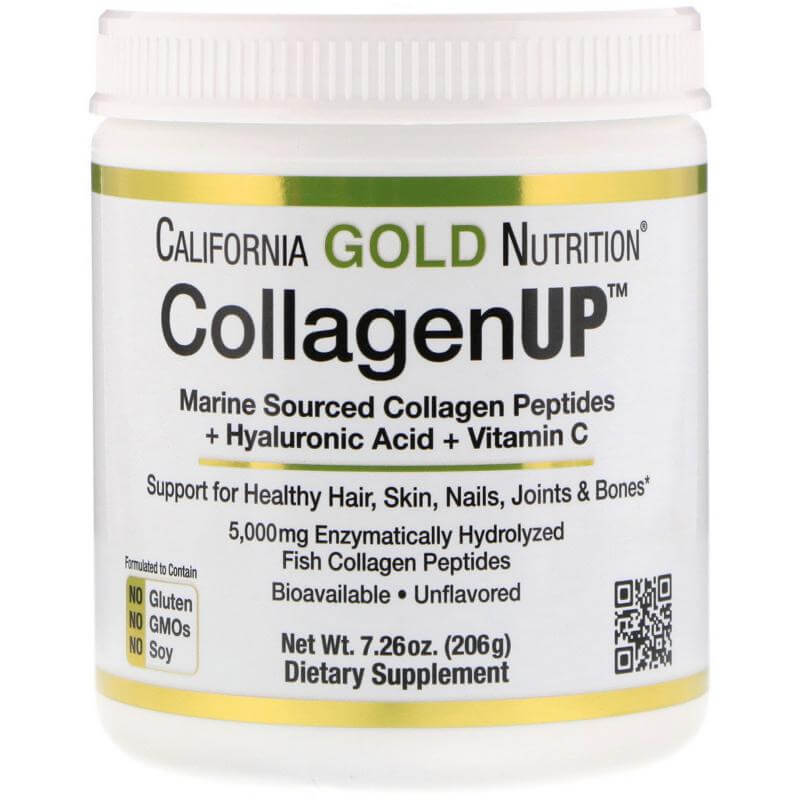
The advantage of this complex is the optimal combination of the three necessary components to maintain the health of the skin and connective tissue – collagen, hyaluronic acid and vitamin C contributes to the best absorption of the drug by the body. In addition, the form of the powder, getting into the stomach, will be absorbed faster than a tablet. And it is convenient to drink it with water or juice.
4) Doctor’s Best Collagen Types 1&3 with Vitamin C
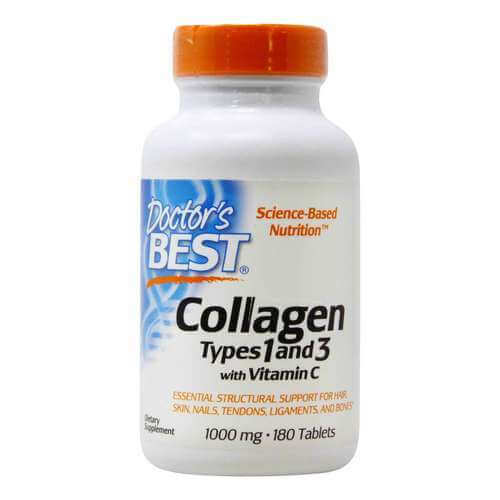
This complex is optimally balanced in composition, and contains pure collagen protein, enzymatically hydrolyzed into low molecular weight peptides for optimal use by the body. Consists of collagen types 1 and 3 (in the form of Peptan) in the amount of 2 grams and ascorbic acid at least 300 grams

